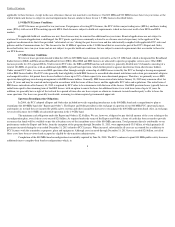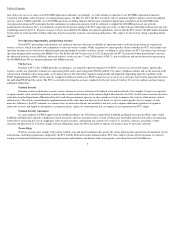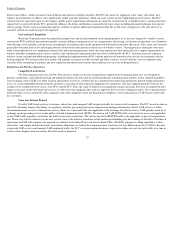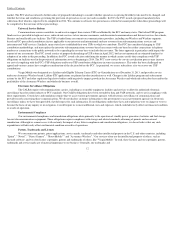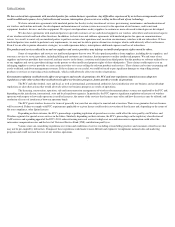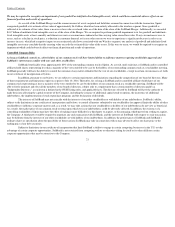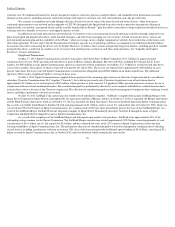Sprint - Nextel 2013 Annual Report Download - page 20
Download and view the complete annual report
Please find page 20 of the 2013 Sprint - Nextel annual report below. You can navigate through the pages in the report by either clicking on the pages listed below, or by using the keyword search tool below to find specific information within the annual report.
Table of Contents
We have entered into agreements with unrelated parties for certain business operations. Any difficulties experienced by us in these arrangements could
result in additional expense, loss of subscribers and revenue, interruption of our services or a delay in the roll
-
out of new technology.
We have entered into agreements with unrelated parties for the day
-
to
-
day execution of services, provisioning, maintenance, and modernization of
our wireless and wireline networks, the development and maintenance of certain systems necessary for the operation of our business, and for network
equipment, handsets, devices, and other equipment. We expect our dependence on key suppliers to continue as more advanced technologies are developed.
We also have agreements with unrelated parties to provide customer service and related support to our wireless subscribers and outsourced aspects
of our wireline network and back office functions. In addition, we have lease and sublease agreements with unrelated parties for space on communications
towers. As a result, we must rely on unrelated parties to perform certain of our operations and, in certain circumstances, interface with our subscribers. If these
unrelated parties were unable to perform to our requirements, we may not be able to pursue alternatives strategies which could adversely affect our business.
Even if we are able to pursue alternative strategies, we could experience delays, interruptions, additional expenses and loss of subscribers.
The products and services utilized by us and our suppliers and service providers may infringe on intellectual property rights owned by others.
Some of our products and services use intellectual property that we own. We also purchase products from suppliers, including device suppliers, and
outsource services to service providers, including billing and customer care functions, that incorporate or utilize intellectual property. We and some of our
suppliers and service providers have received, and may receive in the future, assertions and claims from third parties that the products or software utilized by us
or our suppliers and service providers infringe on the patents or other intellectual property rights of these third parties. These claims could require us or an
infringing supplier or service provider to cease certain activities or to cease selling the relevant products and services. These claims can be time
-
consuming and
costly to defend, and divert management resources. If these claims are successful, we could be forced to pay significant damages or stop selling certain
products or services or stop using certain trademarks, which could adversely affect our results of operations.
Government regulation could adversely affect our prospects and results of operations; the FCC and state regulatory commissions may adopt new
regulations or take other actions that could adversely affect our business prospects, future growth or results of operations.
The FCC and other federal, state and local, as well as international, governmental authorities have jurisdiction over our business and could adopt
regulations or take other actions that would adversely affect our business prospects or results of operations.
The licensing, construction, operation, sale and interconnection arrangements of wireless telecommunications systems are regulated by the FCC and,
depending on the jurisdiction, international, state and local regulatory agencies. In particular, the FCC imposes significant regulation on licensees of wireless
spectrum with respect to how radio spectrum is used by licensees, the nature of the services that licensees may offer and how the services may be offered, and
resolution of issues of interference between spectrum bands.
The FCC grants wireless licenses for terms of generally ten years that are subject to renewal and revocation. There is no guarantee that our licenses
will be renewed. Failure to comply with FCC requirements applicable to a given license could result in revocation of that license and, depending on the nature of
the non
-
compliance, other Sprint licenses.
Depending on their outcome, the FCC's proceedings regarding regulation of special access rates could affect the rates paid by our Wireless and
Wireline segments for special access services in the future. Similarly, depending on their outcome, the FCC's proceedings on the regulatory classification of
VoIP services and a pending appeal of the FCC's 2011 order reforming universal service for high cost area and intercarrier compensation could affect the
intercarrier compensation rates and the level of Universal Service Fund (USF) contributions paid by us.
Various states are considering regulations over terms and conditions of service, including certain billing practices and consumer
-
related issues that
may not be pre
-
empted by federal law. If imposed, these regulations could make it more difficult and expensive to implement national sales and marketing
programs and could increase the costs of our wireless operations.
18


